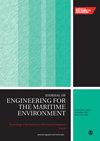Assessment of human error contribution to container loss risk under fault tree analysis and interval type-2 fuzzy logic-based SLIM approach
IF 1.5
4区 工程技术
Q3 ENGINEERING, MARINE
Proceedings of the Institution of Mechanical Engineers, Part M: Journal of Engineering for the Maritime Environment
Pub Date : 2023-10-27
DOI:10.1177/14750902231203074
引用次数: 0
Abstract
Human is a key element of the safety of life on board ships and a significant contributing factor to most of the accidents and incidents in the maritime industry. At this point, risk analysis plays a critical role in ensuring operational safety and maritime transportation sustainability. This paper aims to systematically evaluate how human errors (HEs) contribute to operational risks. Based on this, Fault Tree Analysis (FTA) is combined under an Interval Type-2 Fuzzy Logic environment with Success Likelihood Index Method (SLIM). Whilst the FTA evaluates the criticality of the operational activities, the Interval Type-2 Fuzzy Sets (IT2FS) deals with vagueness and subjectivity in using experts’ judgements, and the SLIM estimates the probabilities for the human error-related basic events. Since container losses can lead to severe damage and catastrophic events in a container terminal, loading operation was investigated as a case study. Safety culture, experience, and fatigue were observed as highly effective factors in crew performance. The obtained results also indicate that this hybrid approach can effectively be applied to determine the operational vulnerabilities in high-risk industries. The paper intends to improve safety control levels and lower losses in the future of maritime container transport besides emphasising the potential consequences of failures and crucial human errors in the operational process.基于故障树分析和区间2型模糊逻辑的SLIM方法下人为错误对集装箱损失风险的贡献评估
人是船舶生命安全的关键因素,也是海运业中大多数事故和事件的重要因素。在这一点上,风险分析在确保运营安全和海上运输的可持续性方面起着至关重要的作用。本文旨在系统地评估人为错误(HEs)对操作风险的影响。在此基础上,将区间2型模糊逻辑环境下的故障树分析(FTA)与成功似然指数法(SLIM)相结合。而区间2型模糊集(IT2FS)在使用专家判断时处理模糊性和主观性,而SLIM估计与人为错误相关的基本事件的概率。由于集装箱丢失会导致集装箱码头的严重损坏和灾难性事件,因此以装货作业为例进行了研究。安全文化、经验和疲劳被认为是影响船员表现的重要因素。研究结果还表明,该方法可以有效地应用于高风险行业的操作漏洞确定。本文旨在提高未来海上集装箱运输的安全控制水平,降低损失,同时强调操作过程中故障和关键人为错误的潜在后果。
本文章由计算机程序翻译,如有差异,请以英文原文为准。
求助全文
约1分钟内获得全文
求助全文
来源期刊

CiteScore
3.90
自引率
11.10%
发文量
77
审稿时长
>12 weeks
期刊介绍:
The Journal of Engineering for the Maritime Environment is concerned with the design, production and operation of engineering artefacts for the maritime environment. The journal straddles the traditional boundaries of naval architecture, marine engineering, offshore/ocean engineering, coastal engineering and port engineering.
 求助内容:
求助内容: 应助结果提醒方式:
应助结果提醒方式:


